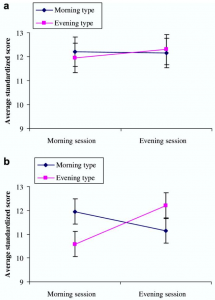Olivia Howell
30 September 2014
Citation
Goldstein, D., Hahn, C., Hasher, L., Wiprzycka, U., & Zelazo, P. (2007). Time of day, intellectual performance, and behavioral problems in morning versus evening type adolescents: Is there a synchrony effect? Personality and Individual Differences, 42(3), 431-440. Retrieved September 30, 2014.
Goal of the study
The study ranked students from ages 11-14 based on their chronotypes and administered tests over the phone and possibly a follow-up test in a lab. The goal was to see how students’ results changed on tests when they were administered in the morning versus in the afternoon.
Hypothesis of the study
The hypothesis was that students who were tested during their preferred time of day (as indicated by their chronotypes test) would receive better results than students tested not at their preferred time of day.
What was measured in the study?
The study measured the results of both telephone and in laboratory administered tests of Vocabulary (“verbal ability”), Block Design (“nonverbal reasoning”), and Digit Span (“short-term memory”).
Figure

Figure description
The two graphs show the correlation between the test scores (y-axis), the two different sessions (x-axis), and the morning/evening chronotypes (2 trendlines). As predicted, the morning types score higher in the morning sessions and the evening types score higher in the evening sessions.
Summary of the major findings of the article
The major finding of this article is that the time of day tests are taken influences the scores of students with increased morning performance in morning type students and increasing evening performance for evening type students. In general, the differences amoung test scores came from results in the Digit Span and Block Design sections suggesting that chronotype/time of day performance especially effects short-term memory and reasoning.
Question I would like to ask the authors of the article
I would like to ask the authors why they think vocabulary was not as affected by changes in session times.
Article link: http://www.ncbi.nlm.nih.gov/pmc/articles/PMC1761650/




